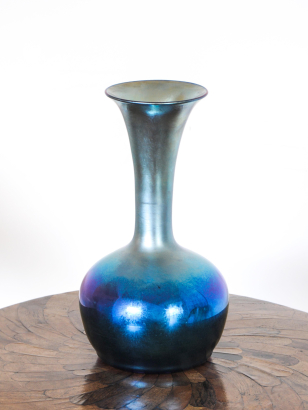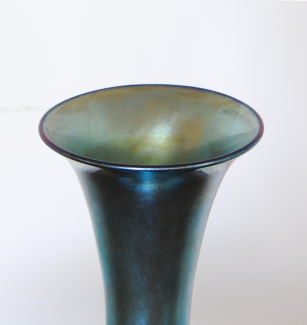Durand Jr Victor
Biography
Victor Durand, Jr. was born in Baccarat, France. As several generations before him, Victor, at the age of 12, went to work in a local glassworks. Victor's grandfather and father worked for Cristalleries de Baccarat, a famous glassworks that was established in 1764. In 1882, Victor Durand, Sr. immigrated to the U.S. Victor, Sr. worked for Wheaton Glass Works and Whitall-Tatum and Company.
In 1884, Victor, Jr. (then 14 yrs. old) and the rest of his family joined his father in the U.S. Victor, Jr.'s first U.S. glass job was for Whitall-Tatum. Then he worked for Wheaton Glass Works. The next decade he worked for several glass factories in Ohio, Pennsylvania, West Virginia, and Canada. During this time, Victor was expanding his glass knowledge.
In 1897, Victor, Jr., with the help of his father, leased a small glassworks then known as Vineland Glass Manufacturing Co., founded in 1892. The company originally made bottles and jars. Victor built a new furnace and started producing glass tubing, rods, and clinical thermometer tubes. The new company started out with only 25 employees. In 1899, Victor, Jr. bought out his father's shares to become sole owner. His father was semi-retired, however his brothers (Henry, Paul, and Charles) worked for the company, although not in executive positions. The plant built of wooden construction and was destroyed by fire in 1904. Later it was rebuilt of iron and brick.
In 1909, New Jersey Clay Pot Company was founded and Victor Durand, Jr. was President and majority stockholder. He also solely owned Vineland Flint Glass Works. By 1920, Victor added a new title, President and majority stockholder of the Newfield Glass Company.
Victor, Jr. still had one burning desire despite his financial success and that was to make art glass. So in 1924, he convinced Martin Bach, Jr. to establish an art glass shop. Martin, Jr. had grown up in his father's business, the Quezal Art Glass Decorating Company in Brooklyn, New York. Quezal was started by Martin Bach, Sr. and Thomas Johnson. Martin Bach, Sr. had previously worked for Tiffany Furnaces as a batch mixer, thus he knew all of Tiffany's formulas. In 1924, Martin Bach, Sr. died. The Quezal Company, already in financial difficulty, closed. Martin Bach, Jr. agreed to go to work for Victor Durand. Thus Durand's "Fancy Shop" was born. Shop, Durand Art Glass was awarded the Medal of Honor at the Sesquicentennial International Exposition in Philadelphia.
The Fancy Shop was not always profitable and was supported by Vineland Flint Glass Works. However, in 1931, Victor Durand, Jr. died from injuries sustained in an automobile accident

